SWEDISH SOUTH ASIAN STUDIES NETWORK
Meeting at North Bengal University, Siliguri, 22 November 2005
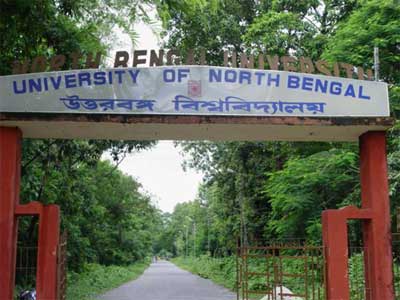 North
Bengal University web page: http://www.nbu.ac.in/
North
Bengal University web page: http://www.nbu.ac.in/
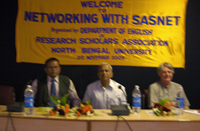 The
meeting was arranged for us at the Conference Hall of the North Bengal
University (NBU). We were greeted by Prof. D.K.
Hazra, Dean of the Faculty of Science, and Dr. T.K.
Chattterjee, the University Registrar. Prof. P.K.
Sengupta, Dean of the Faculty of Arts, Commerce and Law presided over
the meeting.
The
meeting was arranged for us at the Conference Hall of the North Bengal
University (NBU). We were greeted by Prof. D.K.
Hazra, Dean of the Faculty of Science, and Dr. T.K.
Chattterjee, the University Registrar. Prof. P.K.
Sengupta, Dean of the Faculty of Arts, Commerce and Law presided over
the meeting.
There were about 70 persons present, mostly teachers but also a fair deal of PhD candidates, all of them representing the various faculties and disciplines: Botany and Chemistry, as well as Political science, English literature, Sociology, Anthropology and Women’s studies. NBU is a ‘medium-sized university’ with a close interaction, it appears, between faculty of different disciplines.
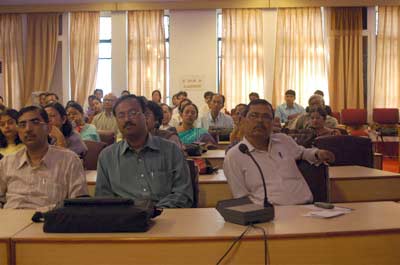 Such
a blending and attendance would be hard to expect when presenting SASNET
at one of the metropolitan universities in India. Like most of the big
universities in Sweden the latter consist of ‘watertight’
departments without much interaction. Is BNU a haven of inter-disciplinary
co-operation or could it be like the smaller universities and colleges
in Sweden?
Such
a blending and attendance would be hard to expect when presenting SASNET
at one of the metropolitan universities in India. Like most of the big
universities in Sweden the latter consist of ‘watertight’
departments without much interaction. Is BNU a haven of inter-disciplinary
co-operation or could it be like the smaller universities and colleges
in Sweden?
After our presentation of SASNET’s core activities we had a very lively interaction to clarify what SASNET could do and not do. We also presented alternative ways of co-operation and exchange of researchers and students, including the planning grants from SASNET and the Linnaeus-Palme exchange programme for teachers and students.
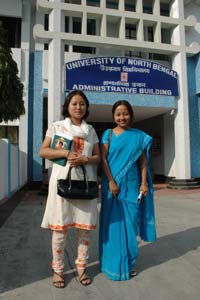 |
| Two PhD students at the Dept. of English, Rosy Chamling and Chiradhini Rai. |
The North Bengal University caters to the six northernmost districts of West Bengal and the State of Sikkim. Besides faculties for science, arts and law, a medical college and a science & technology college are affiliated (but administered separately). BNU is organised like most other Indian universities, so that 70 000 undergraduates attend 87 affiliated colleges, while only graduate studies are organised by the university itself. There are 180 teachers/researchers and about 1 500 Masters and PhD students. Besides, about 30 000 students study in the distance education organised by NBU. From January to September 2005 a total of 35 PhD students passed their degrees, most prominently in Philosophy, English, History, Economics, Botany, Chemistry and Zoology.
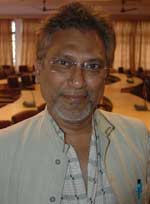 |
| Professor S R Mondal, Chairman, Dept. of Anthropology |
The University has collaboration with some universities in the SAARC
countries but so far not outside South Asia. However, researchers frequently
go to International conferences, and visit and work at institutions all
over the world. Quite a few Indian and foreign scholars also come to lecture
at NBU.
NBU was founded in 1962 and still gives an impression of a young and fresh
university. This is reflected in the research interests of the staff:
No heavy backlog of ancient disciplinary focus on classical learning but
more of contemporary issues, many of them related to the area and region
in which it thrives.
Here is an interest in tribal and immigrant studies against the background of ethnic awakening among the multitude of tribes and nationalities mixing in the area. There is a Centre for Himalayan Studies, and political scientists engage in regional relations with neighbouring countries. Here is an interest in the recent history of Bengal, the partition and the plight of the many immigrants, especially after 1971 and the formation of Bangladesh.
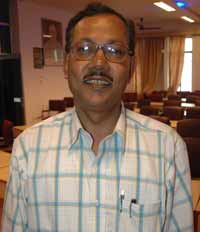 There
is a very active Centre for Women’s Studies organising a lot of
research, also in many other departments of BNU.
There
is a very active Centre for Women’s Studies organising a lot of
research, also in many other departments of BNU.
The Dept. of English is now more into contemporary English language Indian
literature, Bengali and other (rather than Shakespeare, Wordsworth…).
In Botany, there are for example, studies of tea and health, and of herbs
used as folk medicines in Darjeeling hills; in Zoology there is a project
on socio-economic upliftment and empowerment of women of backward rural
communities through backyard fish breeding; and in Chemistry, there is
for example a project on biodegradable thermoplastic starch. The university
already has a strong link to Sweden in Chemistry: Prof. Basudeb
Basu (photo to the right) studied in Lund 1994-96 and now
has collaboration with Umeå University.
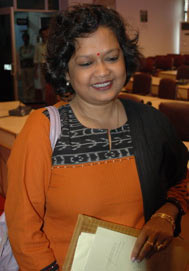
Specific networking ideas
There was a very positive attitude towards research co-operation and
student exchange with Swedish institutions, and there was even a suggestion
that a MoU ought to be signed between SASNET and NBU…
The Centre for Women’s Studies is organising an international seminar
on women’s situation and women’s studies 12-13 April 2006.
The Director, Dr. Sanchari Roy
Mukherjee (photo to the left), would be very happy if there
were Swedish participants.
The Dept. of English would be happy to organise a comparative literature
project on contemporary novels from Sweden and India.
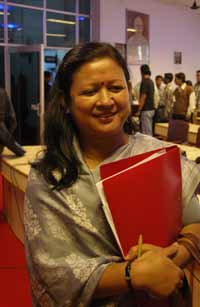 |
| Dr. Maitreyee Choudhury, Centre for Himalayan Studies |
Another project from the same department is about folk culture, including
folk theatre jatra of Bengal, that is, today’s West Bengal and Bangladesh.
Other projects and ideas would be forwarded to us at a later stage and
we have promised to try to liaison with our Swedish partners about these.
All in all this was a very rich and promising interaction in the ‘garden
of Eden’ that is inside the lush green campus of the University
of North Bengal.
Names of participants with whom we interacted most:
• Dr. Chandanashish Laha, Dept. of English
• Prof. Pradip Kumar Sengupta, Professor of Political Science. Dean, Faculty Council for Postgraduate studies in Arts, Commerce and Law. Honorary Director, Centre for Adult and Continuing Education. Director , Directorate of Distance Education
• Professor D K Hazra, Dean of Science Faculty
• Dr. Tapas Kumar Chatterjee, Registrar
• Professor Basudeb Basu, Dept. of Chemistry
• Professor B N Chakraborty, Immuno-Phytopathology Laboratory, Dept. of Botany
• Professor S R Mondal, Chairman, Dept. of Anthropology
• Dr. Maitreyee Choudhury, Reader, Centre for Himalayan Studies
• Dr. Sanchari Roy Mukherjee, Director, Centre for Women’s Studies,
• Dr. Sanjay K Roy, Reader, Dept. of Sociology
• Dr. Soumyajit Samanta, Dept. of English
• Dr. Dilip Kumar Sarkar, Controller of Examinations
• Chisadhini Rai, PhD Candidate, Dept. of English
• Rosy Chamling, PhD Candidate, Dept. of English
SASNET - Swedish South Asian Studies Network/Lund
University
Address: Scheelevägen 15 D, SE-223 70 Lund, Sweden
Phone: +46 46 222 73 40
Webmaster: Lars Eklund
Last updated
2007-01-11
